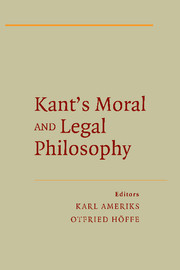Book contents
- Frontmatter
- Contents
- ACKNOWLEDGMENTS
- CONTRIBUTORS
- WORKS BY KANT
- Introduction
- I EARLY CONCEPTIONS
- 1 Hutcheson and Kant
- 2 The Theory of Obligation in Wolff, Baumgarten, and the Early Kant
- II GROUNDWORK OF THE METAPHYSICS OF MORALS
- III CRITIQUE OF PRACTICAL REASON
- IV LEGAL AND POLITICAL PHILOSOPHY
- BIBLIOGRAPHY
- INDEX
2 - The Theory of Obligation in Wolff, Baumgarten, and the Early Kant
Published online by Cambridge University Press: 13 November 2009
- Frontmatter
- Contents
- ACKNOWLEDGMENTS
- CONTRIBUTORS
- WORKS BY KANT
- Introduction
- I EARLY CONCEPTIONS
- 1 Hutcheson and Kant
- 2 The Theory of Obligation in Wolff, Baumgarten, and the Early Kant
- II GROUNDWORK OF THE METAPHYSICS OF MORALS
- III CRITIQUE OF PRACTICAL REASON
- IV LEGAL AND POLITICAL PHILOSOPHY
- BIBLIOGRAPHY
- INDEX
Summary
The 2,500-year history of Western philosophy has witnessed quite fundamental changes in the way that human conduct and action in general has been evaluated and understood. Ernst Tugendhat has attempted to formulate the basic transformation that has transpired between the via antiqua and the via moderna in the sharpest terms as follows: ‘The question governing ancient ethics was: what is it that I truly desire for myself; that governing modern ethics is: how should I properly act in relation to others., The general turn from a classical ethics essentially concerned with the achievement of happiness towards a modern and specifically deontological ethics is usually traced back to the work of Kant. For it is here that moral philosophy effectively seems to lose its earlier character as a theory of happiness to become what is now pre-eminently a theory of duty and obligation. But in fact this Kantian reorientation of practical philosophy, fundamental as it is, is hardly something that simply fell unprepared from the heavens, but one that actually possesses an interesting and significant prehistory of its own. This prehistory has remained largely unexamined and unclarified as far as previous research is concerned.
THEORY OF OBLIGATION
I should like here to make some small contribution to exploring this important lacuna in our knowledge.
Keywords
- Type
- Chapter
- Information
- Kant's Moral and Legal Philosophy , pp. 58 - 74Publisher: Cambridge University PressPrint publication year: 2009
- 9
- Cited by

